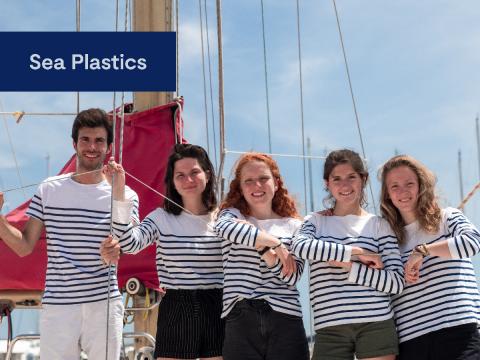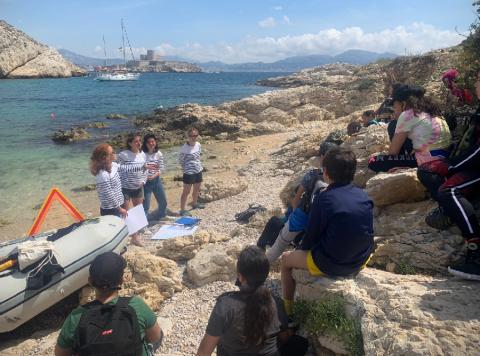
‘Our expedition to combat microplastic pollution confirmed our desire to get involved and fight the environmental cause’
December 14 2022Back from a four-month scientific expedition on a sailing boat along the Spanish, French and Sardinian coasts, Clara Dubel-Jam, President and Head of Communications for the 2022 Sea Plastics crew, tells us more about this student association. All aboard!
Hello Clara. Before getting into the details of your springtime expedition, can you briefly tell us about the Sea Plastics association?
Sea Plastics was founded in 2016 by AgroParisTech students with the aim of conducting annual expeditions in the Mediterranean Sea, on the one hand, to study microplastic pollution by collecting data from the field, and, on the other hand, to protect marine biodiversity by raising awareness. Each year, an expedition lasting several months is conducted with a new crew of motivated students! At the start, only AgroParisTech students took part, but over time the association has opened up to students from other schools, which has enabled us to expand our range of skills.
So each year there is a new team, a new study, and two goals: a scientific objective and a goal to raise awareness.
Yes! This year, our team was composed of four students from AgroParisTech: Alice, the treasurer and route planner, Anne-Laure, secretary in charge of raising awareness, Numa, vice-secretary and a great source of support, and myself! Laurine, a student at EPFL (link) was also recruited as vice-president in charge of the scientific aspect. So that was the team. In practical terms, I was responsible for direct relations with our partners (whom we wanted to engage in our sustainable development goals), Anne-Laure for developing games intended for the general public, Laurine for analyzing samples taken throughout the expedition and Alice for planning the route. Numa, the vice-secretary, provided valuable support for all the work carried out on board, because it is important to understand that, on top of all the principal responsibilities I have mentioned, there is a great deal of logistics to sort out.

Can you give us some examples?
Well, there’s the sampling, for example. We took samples of microplastics during the expedition for our scientific partners to study. This required a great deal of equipment, which demanded a lot of time and effort. Setting up the equipment, trawling (using a manta net or closing net), filtering, eliminating organic compounds, and storing the samples with ethanol is about half a day’s work: in total, we took 36 samples.
Another example is our awareness-raising operations, for which we had to moor in over twenty ports, which also required a certain amount of logistical organization with our hosts: ports, administrative authorities, schools, etc.
Let’s talk about the scientific aim: each year a study theme linked to microplastics is proposed. What was the theme of the 2022 expedition?
This year, we were rather ambitious, as we had not one but two study themes! We studied both the transportation of pollutants by microplastics and, in parallel, the aging of microplastics in environmental conditions. Regarding the first study, it is important to bear in mind that 229,000 tons of microplastics are discharged into the Mediterranean Sea each year (!), carrying with them chemical pollutants in the form of additives combined with the plastics during the manufacturing process (including colorants, flame retardants, lubricants, chemical stabilizers, etc.). How do these pollutants then behave in water? What impact do they have on marine fauna? We know, for example, that with microplastics, the higher up the food chain we go, the higher the concentrations are. But what about the associated pollutants?
The second study was an opportunity to conduct experiments on board, looking at the aging process of plastic under environmental conditions, with eight sampling points (plastic bands) spread around the boat, and we also studied absorption dynamics in the marine environment.
The results are still being analyzed, but we hope to have the results from the sampling we conducted in the next few weeks.
‘The message we want to get across, through games or via more traditional communications with data and figures, is simple: in order to reduce the amount of plastic in our seas and oceans, recycling is not enough – we must, at all costs, reduce our consumption.’
Your second goal was to raise awareness in schools and at open-air events for the general public. What message did you want to get across? What will you take away from this edition?
Firstly, that the operation was, overall, a success. We met with 88 classes (more than 2,000 pupils, from kindergarten to school-leavers!) and more than 800 people came to meet us at our ‘General Public’ stands. There was a great deal of curiosity and a real desire to talk to us. The message we want to get across, through games or via more traditional communications with data and figures, is simple: in order to reduce the amount of plastic in our seas and oceans, we must reduce our consumption. Today, only 35% of our plastic waste is recycled, and what is recycled has to be transported over great distances in order for this to happen. The only real solution is therefore for us all to reduce how much we consume, on an individual level.
How did people, both big and small, react to your awareness-raising campaigns?
Children are always very curious and we were pleasantly surprised to find them already very aware of the issue! They were very receptive to what we had to say on the subject. Adults were interesting. Although we found them keen to discuss the subject, many thought they were already doing enough by recycling their waste, whereas this is not necessarily the most effective solution, particularly as plastic really is everywhere, in everything we buy, from food and cosmetics to clothing (a third of fabric produced today contains microplastics)!
What about you and your crew, what will you take away from your voyage?
I can’t really speak for the others, but on a human level, for me, it was an incredibly rich experience: I didn’t think I would like living with other people in such a cramped space, but actually it was fine (smile). We also had to adapt to some major problems (editor’s note: they had to change boats twice during the voyage, which caused logistical issues as well as a change of route), which was an excellent learning experience! We were really motivated by talking to the people we met and the human contact, which convinced us that what we were doing had real meaning and that we needed to continue the good work.
Did it increase your awareness of environmental causes?
Yes, in a very concrete way! Personally, I knew about Sea Plastics even before I came to AgroParisTech and I had been to their conference the year before, hoping to take part in the 2022 expedition. I can therefore say that this experience really convinced me that I want to continue working on projects linked to the environment and on ecological issues, which will have varying degrees of impact on future society.


